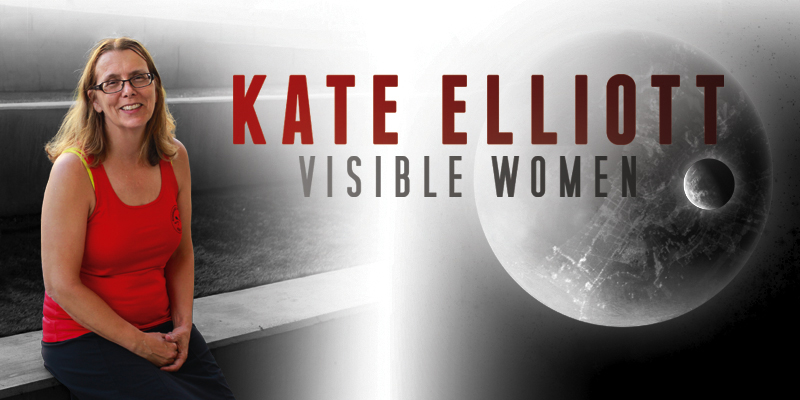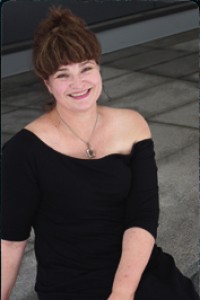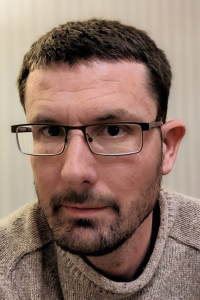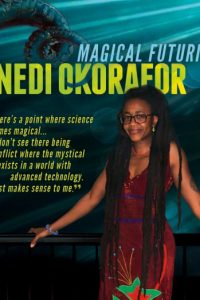Kate Elliott: Visible Women

Kate Elliott is the pen name for Alis A. Rasmussen, born July 27, 1958 in Des Moines IA. She studied at University College of North Wales – Bangor and at Mills College in Oakland CA, graduating with a BA in English in 1980. In 1985 she married Jay Silverstein; they have three children. Elliott has lived in Hawaii for the past 16 years.
Debut novel The Labyrinth Gate appeared as by Alis Rasmussen (1988), and was followed by the Highroad trilogy: A Passage of Stars, Revolution’s Shore, and The Price of Ransom (all 1990). As Kate Elliott, she published Jaran (1992), beginning a series that continued with His Conquering Sword (1993), An Earthly Crown (1993), and The Law of Becoming (1994). The Crown of Stars series began with Nebula Award finalist King’s Dragon (1997) and continued with Prince of Dogs (1998), The Burning Stone (1999), Child of Flame (2000), The Gathering Storm (2003), In the Ruins (2005), and Crown of Stars (2006). The Crossroads trilogy includes Spirit Gate (2006), Shadow Gate (2008), and Traitors’ Gate (2009). The Spiritwalker trilogy has Cold Magic (2010), Cold Fire (2011), and Cold Steel (2013), as well as chapbooks The Secret Journal of Beatrice Hassi Barahal (2013) and The Beatriceid (2015). The Court of Fives YA fantasy trilogy started with Andre Norton Award nominee Court of Fives (2015) and continued with Poisoned Blade (2016) and Locus Award finalist Buried Heart (2017), and includes related novellas Night Flower (2015) and Bright Thrones (2017). RT Award winner Black Wolves appeared in 2015. With Melanie Rawn & Jennifer Roberson she wrote World Fantasy Award finalist The Golden Key (1996). Elliott recently wrote a series of connected stories set in the world of Magic: The Gathering, exploring some of the setting’s lore, available online here: <magic.wizards.com/en/articles/columns/magic-story>.
Her current project is The Sun Chronicles, a genderbent Alexander the Great-inspired space opera, with the first volume expected in 2019.
Excerpts from the interview:
“I often talk to myself while I walk, because I’m a kinesthetic person. It took me a long time to understand that I am an athlete, because when I was young, it wasn’t part of what girls were supposed to be. I had to grow up being me and knowing that I wasn’t supposed to be like this, but I was anyway. One of the things that took me a long time to learn was that I’m a kinesthetic learner – I need to gesture, and I need to move. I also think too much, because I have anxiety, and to detach my brain, I have to move. That lets my brain rest. I’m sure there’s some neurological reason for it. If I’m stuck on a plotline, and I walk, that relaxes my brain, and things come to me.
“I still struggle with being the kind of person I am versus what society says I should be. Many people spend their whole lives struggling with a sense that they didn’t live up to what society told them they should be. Women of my generation had to either learn to accept themselves or try to deny and bury. For women in that time, there was a certain way you were supposed to acquiesce to power, and to the dominant culture. A woman’s job was to facilitate men. A part of me always felt like I was wrong, but another part of me didn’t want to give up who I was. I was incredibly fortunate to have a wonderful father – he’s now passed away – who didn’t try to make me be someone I wasn’t. He was supportive of me and who I was. He had four children and he let us all be who we were. He tried to figure out who we were, and then treat us each according to what was necessary or right for us. That helped me more than I can say – knowing I was okay with him, when he was the person I admired most. Of course it was my father, and in a patriarchal society, it matters if your father says you’re okay, so that’s sexist, but it was also true.
“One of the funny things about getting older is you just start not giving a fuck. For women anyway. I don’t know how this dynamic works with men, and I certainly don’t know how it works as we shift out of a binary system into a more nonbinary system, which is in its early days in our culture, but it happens for women, because you realize that giving a fuck didn’t help. It didn’t help when you were younger, and it’s certainly not going to help now. Women in our culture get more and more invisible as they get older. When my husband got his PhD at Penn State, I was in my thirties, and there’s this moment where, in a culture like that, you suddenly cross a threshold where you’re not sexually interesting to the young men going to school anymore. Not that you care, but suddenly you go from being someone who they notice to someone who they don’t notice, and you’re like, ‘When did that happen?’
“We moved to Hawaii in 2002, and Hawaii is part of the greater Pacific Island and Polynesian culture area – there are different cultures, the Polynesians, the Micronesians, the Melanesians – but they’re all auntie cultures. That means you have these extended kinship groups, and aunties have a lot of power. Older women here are visible, noticeable, and they matter.
“The older I get, the more I notice how different it is coming to the mainland. Maybe not so much in the science fiction world, because I have created a certain place for myself here, but I do notice it in terms of subcultures within the SF community, because there are groups of people who seem to think, ‘Well, now you’re older, so who cares.’ Then other groups of people, who maybe come from cultures where their elders are important, treat you better. Once you get used to being seen, it’s hard to step back and not be seen. So when I come to the mainland, I’m always like, ‘Whoa.’ Older women don’t have it that good here. It is culture shock.
“When I was in ninth grade, my best friend and I started writing a fantasy story together. We drew a map and started writing. It was about dudes, because that was what fantasy was about. In high school I began working on a long novel (which no one will ever read and which I should probably burn). It’s about three princesses who are sisters who go on an adventure and meet these three princes and whatever. That was the crossover point, where I decided I wanted to tell stories about girls and women. I imprinted on Tolkien, and I just love those stories, because that was me – ‘I’m going to go on an adventure, to range across the land, to be a ranger and ride’ – except those characters were all guys. There was a point for me in high school, when I said, ‘I’ll just write these stories with girls in them.’ There was no one to tell me no – because no one I knew read fantasy, for one thing. I just started writing the stories I liked, with girls in them, and that just kept going. Once you start down that road, it’s hard to turn back. You realize at the moment someone tells you that you can’t do a thing, that’s them telling you to do it. They don’t want you to do it, but they can’t stop you. Well, there are cases where they can stop you, and I won’t go into the real ways people can be harmed and destroyed and killed in the world, we know that is possible – but there are other spaces and other ways in which people want you to stop, when they can’t really stop you. Then it’s only your own internalization that can stop you. That’s not to blame the victim, but just to say that, for me, it was a powerful moment when I said, ‘I can tell the story how I want to tell it. Nothing may come of it, and no one else may ever see it, but for me, it’s meaningful.’
“When I was in college, I wrote a bad fantasy novel, which will never be published, because it’s not good. It has two main characters: one is a young man, a farmer coming to the city, and another is a young woman who has magic. I later used elements of that book in other works. It’s reflected in Crown of Stars, which opens with two main characters, a young man who’s a farmer, Alain, who has this dream about the glory of war – and then of course, it’s a very long and difficult, terrible journey for him. Then there’s a girl who’s magic. So this bad novel has the magic girl and the farm boy coming to the city, and the magic girl ends up getting caught up with a princess and her ladies in waiting, and has to escape the palace intrigue. There are a lot of women in that book. It never got published, which is fine, because that’s what you’re supposed to do – you’re supposed to write the bad stuff first. You just need practice.”
Interview design by Francesca Myman. Photo by Arley Sorg.
Read the full review in the October 2018 issue of Locus.
 While you are here, please take a moment to support Locus with a one-time or recurring donation. We rely on reader donations to keep the magazine and site going, and would like to keep the site paywall free, but WE NEED YOUR FINANCIAL SUPPORT to continue quality coverage of the science fiction and fantasy field.
While you are here, please take a moment to support Locus with a one-time or recurring donation. We rely on reader donations to keep the magazine and site going, and would like to keep the site paywall free, but WE NEED YOUR FINANCIAL SUPPORT to continue quality coverage of the science fiction and fantasy field.







